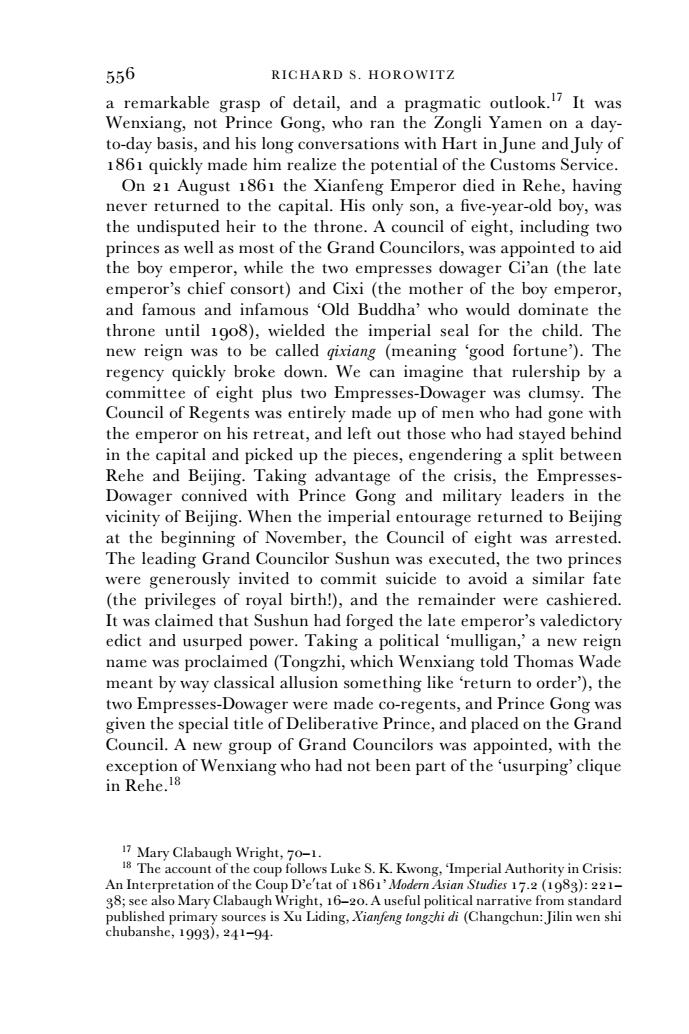正在加载图片...

556 RICHARD S.HOROWITZ a remarkable grasp of detail,and a pragmatic outlook.17 It was Wenxiang,not Prince Gong,who ran the Zongli Yamen on a day- to-day basis,and his long conversations with Hart in June and July of 1861 quickly made him realize the potential of the Customs Service. On 21 August 1861 the Xianfeng Emperor died in Rehe,having never returned to the capital.His only son,a five-year-old boy,was the undisputed heir to the throne.A council of eight,including two princes as well as most of the Grand Councilors,was appointed to aid the boy emperor,while the two empresses dowager Ci'an (the late emperor's chief consort)and Cixi(the mother of the boy emperor, and famous and infamous 'Old Buddha'who would dominate the throne until 1908),wielded the imperial seal for the child.The new reign was to be called gixiang (meaning 'good fortune).The regency quickly broke down.We can imagine that rulership by a committee of eight plus two Empresses-Dowager was clumsy.The Council of Regents was entirely made up of men who had gone with the emperor on his retreat,and left out those who had stayed behind in the capital and picked up the pieces,engendering a split between Rehe and Beijing.Taking advantage of the crisis,the Empresses- Dowager connived with Prince Gong and military leaders in the vicinity of Beijing.When the imperial entourage returned to Beijing at the beginning of November,the Council of eight was arrested. The leading Grand Councilor Sushun was executed,the two princes were generously invited to commit suicide to avoid a similar fate (the privileges of royal birth!),and the remainder were cashiered. It was claimed that Sushun had forged the late emperor's valedictory edict and usurped power.Taking a political 'mulligan,'a new reign name was proclaimed(Tongzhi,which Wenxiang told Thomas Wade meant by way classical allusion something like 'return to order'),the two Empresses-Dowager were made co-regents,and Prince Gong was given the special title of Deliberative Prince,and placed on the Grand Council.A new group of Grand Councilors was appointed,with the exception of Wenxiang who had not been part of the usurpingclique in Rehe.18 17 Mary Clabaugh Wright,70-1. 18 The account of the coup follows Luke S.K.Kwong,Imperial Authority in Crisis: An Interpretation of the Coup D'e'tat of 1861'Modern Asian Studies 17.2(1983):221- 38;see also Mary Clabaugh Wright,16-20.A useful political narrative from standard published primary sources is Xu Liding,Xianfeng tongzhi di(Changchun:Jilin wen shi chubanshe,1993),241-94556 RICHARD S. HOROWITZ a remarkable grasp of detail, and a pragmatic outlook.17 It was Wenxiang, not Prince Gong, who ran the Zongli Yamen on a dayto-day basis, and his long conversations with Hart in June and July of 1861 quickly made him realize the potential of the Customs Service. On 21 August 1861 the Xianfeng Emperor died in Rehe, having never returned to the capital. His only son, a five-year-old boy, was the undisputed heir to the throne. A council of eight, including two princes as well as most of the Grand Councilors, was appointed to aid the boy emperor, while the two empresses dowager Ci’an (the late emperor’s chief consort) and Cixi (the mother of the boy emperor, and famous and infamous ‘Old Buddha’ who would dominate the throne until 1908), wielded the imperial seal for the child. The new reign was to be called qixiang (meaning ‘good fortune’). The regency quickly broke down. We can imagine that rulership by a committee of eight plus two Empresses-Dowager was clumsy. The Council of Regents was entirely made up of men who had gone with the emperor on his retreat, and left out those who had stayed behind in the capital and picked up the pieces, engendering a split between Rehe and Beijing. Taking advantage of the crisis, the EmpressesDowager connived with Prince Gong and military leaders in the vicinity of Beijing. When the imperial entourage returned to Beijing at the beginning of November, the Council of eight was arrested. The leading Grand Councilor Sushun was executed, the two princes were generously invited to commit suicide to avoid a similar fate (the privileges of royal birth!), and the remainder were cashiered. It was claimed that Sushun had forged the late emperor’s valedictory edict and usurped power. Taking a political ‘mulligan,’ a new reign name was proclaimed (Tongzhi, which Wenxiang told Thomas Wade meant by way classical allusion something like ‘return to order’), the two Empresses-Dowager were made co-regents, and Prince Gong was given the special title of Deliberative Prince, and placed on the Grand Council. A new group of Grand Councilors was appointed, with the exception of Wenxiang who had not been part of the ‘usurping’ clique in Rehe.18 17 Mary Clabaugh Wright, 70–1. 18 The account of the coup follows Luke S. K. Kwong, ‘Imperial Authority in Crisis: An Interpretation of the Coup D’e tat of 1861’ Modern Asian Studies 17.2 (1983): 221– 38; see also Mary Clabaugh Wright, 16–20. A useful political narrative from standard published primary sources is Xu Liding, Xianfeng tongzhi di (Changchun: Jilin wen shi chubanshe, 1993), 241–94.�